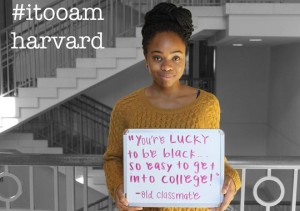 An article over the week-end in the NY Times discussed racial “microaggressions”, an increasingly used term on U.S. college campuses to describe “the subtle ways that racial, ethnic, gender and other stereotypes can play out painfully in an increasingly diverse culture”. The Times cites examples: “A tone-deaf inquiry into an Asian-American’s ethnic origin. Cringe-inducing praise for how articulate a black student is. An unwanted conversation about a Latino’s ability to speak English without an accent.” These are clearly not examples of full-blown racism, but are indicators of a lack of awareness and sensitivity. At a number of universities currently there are discussions of microagressions, through Facebook pages, photo projects, or blogs. There is debate in these forums as to whether the examples given are legitimate reasons to feel slighted or whether, as the Times states, they represent “a new form of divisive hypersensitivity, in which casual remarks are blown out of proportion.” The term’s prominence comes in part from the popularity of a blog begun by two Columbia University studens, the Microagressions Project.
An article over the week-end in the NY Times discussed racial “microaggressions”, an increasingly used term on U.S. college campuses to describe “the subtle ways that racial, ethnic, gender and other stereotypes can play out painfully in an increasingly diverse culture”. The Times cites examples: “A tone-deaf inquiry into an Asian-American’s ethnic origin. Cringe-inducing praise for how articulate a black student is. An unwanted conversation about a Latino’s ability to speak English without an accent.” These are clearly not examples of full-blown racism, but are indicators of a lack of awareness and sensitivity. At a number of universities currently there are discussions of microagressions, through Facebook pages, photo projects, or blogs. There is debate in these forums as to whether the examples given are legitimate reasons to feel slighted or whether, as the Times states, they represent “a new form of divisive hypersensitivity, in which casual remarks are blown out of proportion.” The term’s prominence comes in part from the popularity of a blog begun by two Columbia University studens, the Microagressions Project.
At Harvard, a photo project called, “I, too, am Harvard” explores microaggressions experienced by black students at the elite university. Many cite references to the appearance, often centered around hair, or casual statements about it being nice to be black when applying to Harvard. That latter comment reflects one likely origin of such comments, the perceived experience of minority students receiving preferential treatment through affirmative action programs. The photo project at Harvard has since morphed into a play.
An interesting take on such slights comes from Nigerian novelist, Chimamanda Ngozi Adichie. In a recent interview on NPR, Adichie recounts the bafflement she felt when a black fellow student at Princeton took offense at a classmate talking about watermelon. As an African, she has had to learn the cultural dimensions of being black in the U.S. Interestingly, she has a lot to say in the interview about hair and the importance of how Nigerian women chose their hair styles, a topic that also comes up in her wonderful novel, Americanah.